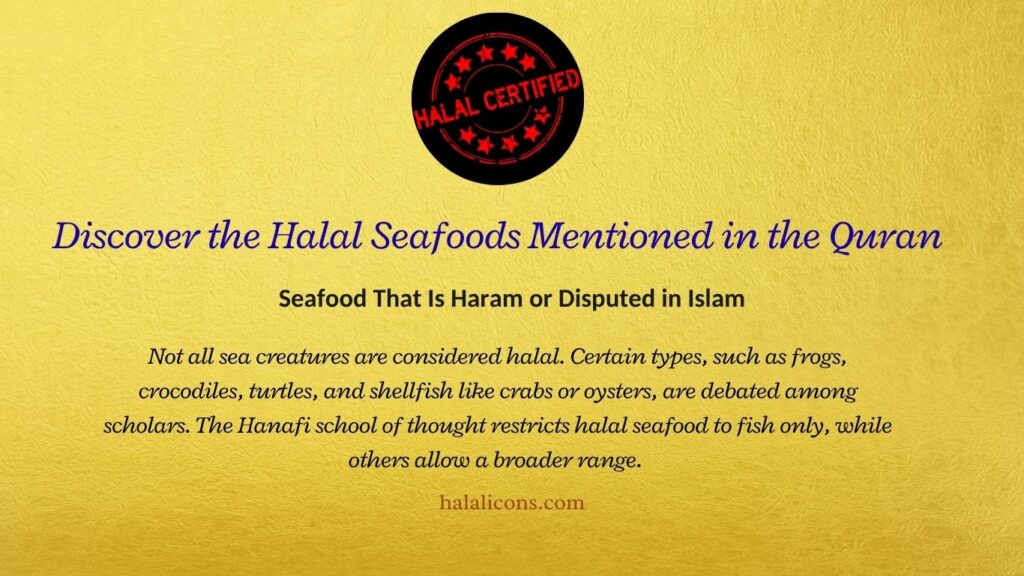Seafood holds a special place in Islamic dietary laws, but not all sea creatures are treated equally when it comes to halal and haram rulings. Many Muslims often wonder, “Is seafood halal according to the Quran?” or “What kinds of fish are permissible in Islam?”
The Quran provides clear guidance about what is lawful to eat from the sea, helping believers follow a halal lifestyle with confidence.
This article explores the Quranic verses mentioning seafood, the Prophet’s teachings on marine life, and clarifies which types of seafood are considered halal or haram according to Islamic principles.
Quranic Evidence for Halal Seafood

The Quran clearly states that seafood is one of Allah’s lawful blessings. In Surah Al-Maidah (5:96), Allah says, “Lawful to you is the game from the sea and its food as provision for you.” This verse confirms that most seafood is halal for Muslims. It emphasizes that the sea’s creatures are a source of sustenance and mercy.
Based on this verse, Islamic scholars agree that fish and other edible sea animals are permissible in Islam. This Quranic evidence serves as the foundation for understanding halal fish types and helps Muslims make confident food choices aligned with Islamic dietary laws.
You might also like: Is Vanilla Extract Halal or Haram?
Hadiths About Eating Seafood
The Hadiths further clarify what the Quran mentions about halal seafood. The Prophet Muhammad (ﷺ) said, “Its water is pure and its dead are lawful” (Sunan Abu Dawood 83). This means seafood can be eaten even if not slaughtered, unlike land animals.
Companions of the Prophet also ate fish and other sea creatures while traveling. These authentic Hadiths strengthen the understanding that most seafood is halal in Islam.
Together with the Quran, they provide Muslims with clear guidance about which marine animals are permissible to eat and which should be avoided under Islamic dietary laws.
Types of Halal Seafood According to Islam
Islamic scholars agree that fish with scales—such as salmon, tuna, cod, and sardines—are halal. These types of fish fall under the permissible category mentioned in the Quran. Other sea animals like shrimp, prawns, and lobsters are also considered halal by most scholars. Since they live entirely in water and die naturally when taken out, they are lawful to eat.
These halal seafood types provide an excellent source of nutrition and align perfectly with Islamic principles. Muslims can enjoy these varieties with peace of mind, knowing they are supported by both Quranic teachings and prophetic traditions.
Seafood That Is Haram or Disputed in Islam

Not all sea creatures are considered halal. Certain types, such as frogs, crocodiles, turtles, and shellfish like crabs or oysters, are debated among scholars. The Hanafi school of thought restricts halal seafood to fish only, while others allow a broader range.
Animals that live both in water and on land are usually haram because they don’t meet the conditions of pure sea life.
When in doubt, it’s best to follow your madhab or consult a trusted scholar. Understanding these differences helps Muslims avoid haram seafood while following Islamic dietary laws sincerely.
Scientific and Nutritional Perspective
Seafood is not only halal but also highly nutritious. It’s rich in omega-3 fatty acids, protein, and essential vitamins that support brain and heart health. The Quran encourages Muslims to consume what is wholesome and beneficial, and seafood perfectly fits that description.
By including halal fish in your diet, you’re following both spiritual and scientific wisdom. It’s an example of how Islamic teachings align with modern health knowledge, showing that halal choices aren’t just about faith—they’re also about overall well-being.
You might also like: Why Pork Is FORBIDDEN (Haram) In Islam!
FAQs About Halal Seafood in the Quran
Q1: Is all seafood halal in Islam?
Most seafood is halal, but animals that live on land and in water may not be permissible.
Q2: Which seafood is clearly mentioned in the Quran?
The Quran refers broadly to “game from the sea” in Surah Al-Maidah (5:96), making fish and other marine foods lawful.
Q3: Is shrimp halal in Islam?
Yes, shrimp is generally considered halal according to most Islamic scholars.
Q4: Can Muslims eat shellfish like crab or lobster?
This depends on the school of thought. Some consider them halal, while others classify them as makruh (discouraged).
Final Thoughts
The Quran and Hadith provide clear guidance about halal seafood, helping Muslims make confident dietary choices. While differences in opinion exist, the majority of seafood remains permissible in Islam. Choosing halal fish not only aligns with Islamic dietary laws but also supports a healthy lifestyle.
Always remember, Islam promotes balance—eat what is lawful, pure, and beneficial. By understanding what seafood is halal, Muslims can enjoy the blessings of the sea while staying faithful to their beliefs and the teachings of the Quran.
Qamar Ul Haq is an Islamic historian and writer with a passion for uncovering the rich heritage of Muslim civilizations. Through in-depth research and storytelling, He brings to life the achievements, struggles, and contributions of the Ummah throughout history.